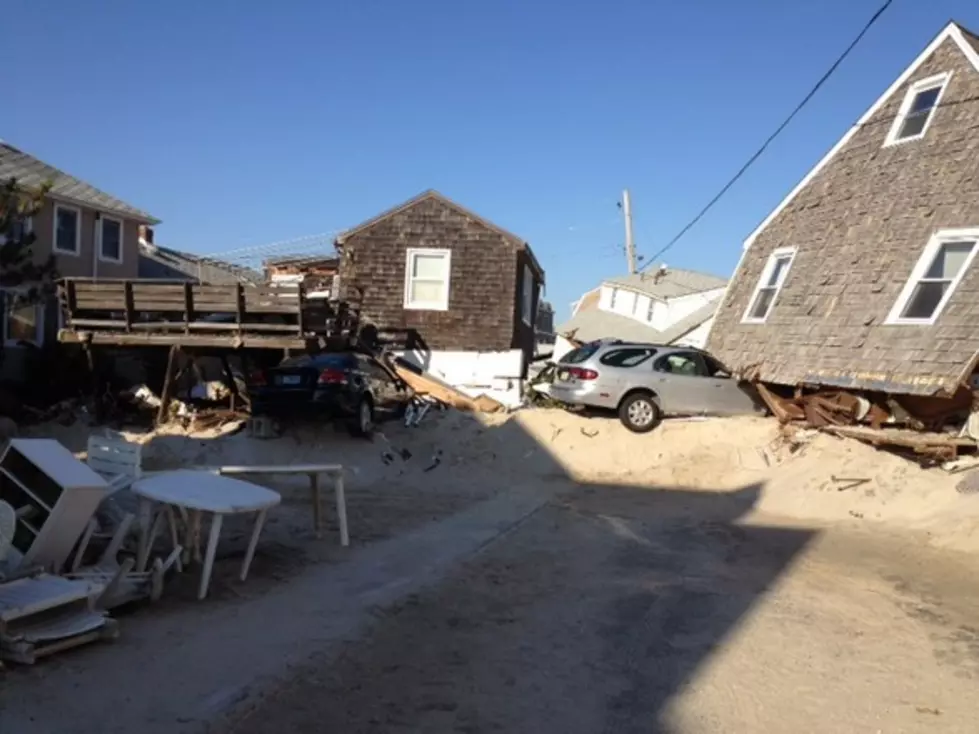NJ Senate To Hold Hearings Into Rebuilding After Sandy [AUDIO]
To ensure the rebuilding process leaves New Jersey in a stronger position to face future storms, the state Senate budget panel will hold a series of hearings in areas of the state hardest hit by Superstorm Sandy.
Senate President Steve Sweeney, Senate Republican Leader Thomas Kean Jr., and Budget & Appropriations Committee Chairman Paul Sarlo and ranking Republican Anthony Bucco Sr. said they are holding the hearings to to better educate lawmakers about how to rebuild the state in a smarter way.
"So-called 'hundred year storms' now seem to be happening every year and we need to be better prepared," said Sweeney (D-Gloucester/Cumberland/Salem). "We don't want to point fingers or pass blame. We want to know where and how things went wrong and what we need to do to better protect ourselves in the future. We need to know how to better secure our homes and businesses, our electric supply and our voting process."
"Before the Legislature can address any needs or deficiencies in New Jersey's storm response infrastructure, we need to first listen to the citizens and leaders of the communities hardest hit," said Kean (R- Union). "Our goal is to minimize damage to property and infrastructure and prevent human casualties, and the Legislature must act in a comprehensive way that enables the return normal as quickly as possible after these events. The Administration has done a remarkable job in responding to Sandy with the tools and resources it has today, but if there are things the Legislature can do to help state emergency responders do their jobs more easily in the future we need to know about them."
The lawmakers said the hearings would be broad in their focus to encompass as many of the challenges faced most recently in Superstorm Sandy. In addition to rebuilding the state's barrier islands and flood-prone areas, the hearings will also focus on improving responses for utility restoration, flood prevention, evacuations, and ensuring impacted residents can have access to their homes in an orderly manner after a disaster.
"We want to bring the utilities in, planning experts, zoning officials, OEM folks...so that the next time these storms hit we are prepared and we minimize the damage," added Sweeney. "Does that include things like requiring that homes along the shore be raised above a certain level, we might talk about buying out flood-prone properties so that we can return that land to its natural state and save people the time and money of continuously going through these floods, we will also talk to the utilities about burying their lines and how cost effective and manageable that might be to do. There are a lot of issues up for discussion here."
They also said that improvements must be made to the state's voting processes to ensure residents are not disenfranchised or do not lose their right to a secret ballot should another storm hit the state just prior to an election.
"In a span of 14 months, New Jersey has been hit by two tropical storms, a damaging autumn snowstorm and a superstorm, each one leaving the state flooded and without power," said Sarlo (D-Bergen). "We have stretched the storm-response infrastructure we have in place as thin as it can go, and it has shown signs of breaking. If these storms are going to be the new normal, we need to think of new response systems that are outside the norm if we are going to be able to survive with minimal damage."
"When lives and billions of dollars in property and infrastructure are at stake, we must constantly review the state's preparedness," said Bucco (R- Morris). "The state's superb response to Sandy notwithstanding, there are many lessons to be learned from those most severely impacted.
The first hearing will be held 11 a.m. Monday, Nov 26TH, at the Toms River Municipal Complex in Ocean County and will focus on the issues facing rebuilding the Jersey Shore and lessons learned.
Future hearings in additional locations hit hard by the storm are being planned over the coming weeks.
"New Jersey is still cleaning up from Sandy, but soon that process will transition to rebuilding, and we need to make sure we're not just setting ourselves up for more destruction the next time," said Sweeney. "There is no one solution to making New Jersey more storm-resistant. But if the past shows us a glimpse of the future, then we all must recognize the need for this comprehensive effort."
More From 92.7 WOBM










